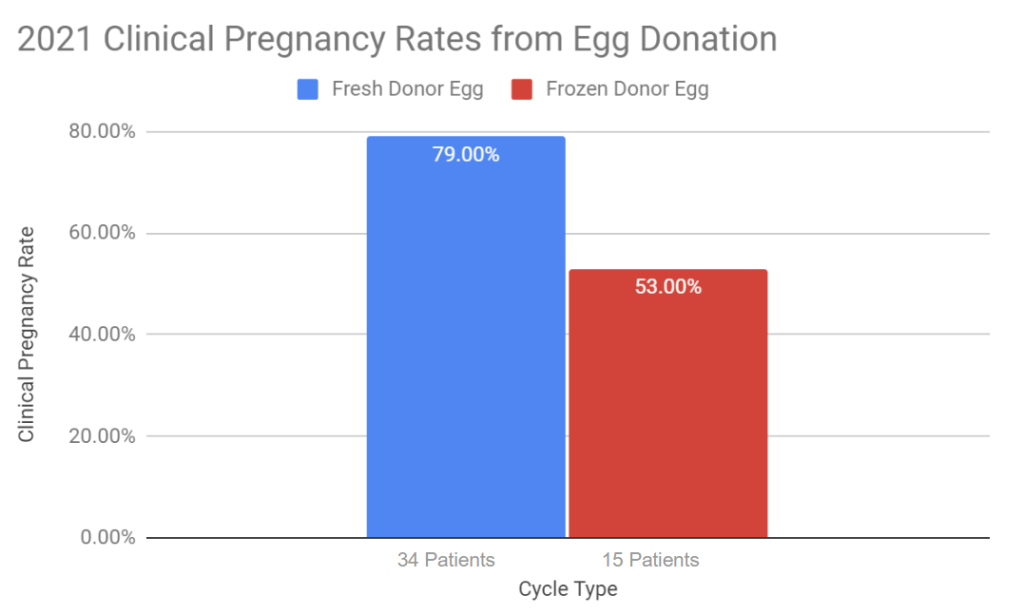Success Rates
Donor Egg Success
Our mission at Coastal Fertility Specialists is to provide pregnancy rates in the top 10% of the country in a compassionate and nurturing environment. In the donor egg program we do this through an incredible team of nurses and physicians. The heart of the donor egg program is obtaining the highest quality eggs which is performed through a rigorous egg donor selection and screening process in which only 2% of all screened donors ever undergo egg retrieval!
Success to Coastal Fertility Specialists means high quality patient care measured by patient satisfaction and high pregnancy rates. Evidence of our high quality patient care is our 3 consecutive national patient satisfaction awards. Understanding success measured by pregnancy rates can be more complicated as success rates depend on a number of different factors, including patient age, ovarian reserve and the infertility diagnosis.
The high quality of Coastal Fertility Specialists care continues with our “cutting edge” embryology laboratory headed up by our onsite, high complexity laboratory director, Dr. Jeff Gray, PhD, HCLD, TS. The laboratory uses the latest fourth generation embryo incubators coupled with the use of embryo isolettes to minimize the amount of time an embryo is out of it’s normal physiological environment. Assisted hatching is utilized when necessary to improve implantation along with vitrification techniques to maximize egg and embryo cryopreservation survival.
How Can You Understand A Center’s Specific Pregnancy Rate?
In order to provide the highest level of care for you, we are proud members of the Society for Assisted Reproductive Technology (SART) and report our annual pregnancy rates to SART. SART then performs random audits verifying results and publishes our results and other center’s results in an easy to understand format. Please click here to view our 2020 assisted reproductive technology success rates. There are many variables to consider and we are happy to guide you through that discussion during your new patient consult.
We are proud of our pregnancy rates. To help you understand the impact of our individualized patient care on our patient’s pregnancy rates, we have added our most recent pregnancy rates from the year 2021. This graph shows the clinical pregnancy rate (pregnancy within the uterus at 7 weeks of pregnancy with fetal cardiac activity) after the transfer of an embryo from egg donation.
2021 Egg Donation Clinical Pregnancy Rates per Transfer

A comparison of clinic success rates may not be meaningful because patient medical characteristics, treatment approaches and entrance criteria for ART may vary from clinic to clinic.
Coastal Fertility Specialists has chosen and passed the highest standards in laboratory accreditation. We are fully accredited as a high complexity laboratory from the Clinical Laboratory Improvement Amendments of 1988 (CLIA), the College of American Pathologists (CAP), The US Food and Drug Administration (FDA), the Centers for Disease Control (CDC) and the American Association for Accreditation of Ambulatory Surgery Facilities (AAAASF).
Types of Donor Egg Cycles
We offer three different types of donor egg donation:
- Single fresh donor egg cycles are where all of the eggs from one donor are given to one recipient. The eggs are fertilized at retrieval and the resultant embryos cultured in the embryology lab with a fresh transfer of typically one or two embryos.
- Split fresh donor egg cycles involve splitting the eggs from one donor to two recipients. The eggs are fertilized at retrieval and the resultant embryos cultured in the embryology lab with a fresh transfer of typically one or two embryos. Costs are shared and therefore split donor egg cycles are less expensive than single donor egg cycles.
- Frozen donor egg cycles involve the use of eggs that have already been retrieved and are currently stored and available for transfer. To increase donor selection we are one of the founding partners of Donor Egg Bank USA.


